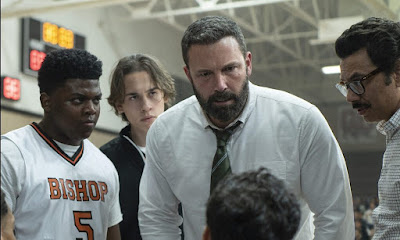“The Way Back” is akin to “Hoosiers” if the violent-tempered Norman Dale had permanently been replaced as head basketball coach by the hard-drinking Shooter Flatch. Indeed, if director Gavin O’Connor’s film is a familiar hardwood fairytale, right down to the mute kid who turns out to be star, it also proves as much about alcoholism as it is about basketball, belied in the music’s score, more somber than spirited, if sometimes too somber, overly insistent on its mournful piano rather than letting the situational severity speak for itself. But if such melancholy teases a refreshing sentience about basketball being a pipe dream to escape or starting over, “The Way Back” can’t bring itself to follow through, which is why it concludes by literally bathing its character in the warm California sun.
At the same time, set in San Pedro, California, “The Way Back”, despite often being sunny in terms of weather, never feels exactly bright, O’Connor’s frequent lens flares not a neat trick but an evocation of an omnipresent hangover, blinding Jack Cunningham (Ben Affleck) waking up hungover to another day. Even before you see him drink a beer in the shower, you can surmise from his downbeat air that he isn’t drinking coffee from his travel mug on the construction site where he toils. His situation is so grave, in fact, and Affleck plays it with such pent-up rage, even in his lighter moments, like goofing with kids at Thanksgiving, that Michaela Watkins as his sister, who I’ve never seen give a performance without some sort of eccentric energy, is entirely restrained, figuratively walking on eggshells around Affleck’s character. Even in “Hoosiers”, where his character’s backstory was shrouded in one terrible act of violence, Gene Hackman had a twinkle in his eye betraying humanity. In a scene where Jack makes a practice phone call, Affleck evinces that any sense of humanity is a put-on.
Jack’s One Last Shot at redemption comes in the form of an offer to coach the Catholic Boys basketball team for which he once starred, long, long ago. If he’s initially hesitant, he finally takes the gig and helps turn the team around, getting reticent Brandon (Brandon Wilson) to believe in himself, speak up and take charge. If O’Connor creates a real sense of high school basketball atmosphere, the cramped gymnasiums making it feel as if the crowd is right on top of the coach, it is nevertheless the coach that is his central focus more than the crowd and more than the players, even. A recurring gag finds Jack flouting the school’s policy against profanity, epitomizing its comical, knowing evocation of coaches as big babies. More than, though, in both the character’s costuming, rumpled dress shirts never tucked in, and his air, Affleck is pointedly not playing redemption so much as desperation. When he designs a game-winning play in a neatly choreographed scene and when he leads them to victory in the otherwise obligatory Big Game, he never comes across like someone clearing his mind or getting it together but someone who needs this as much as he used to need his next drink.
Affleck’s manic air in these scenes underlines the movie’s ultimate insight, that basketball and winning basketball does not cleanse all sins, brought home in how “The Way Back” refrains from ending with The Big Game, forcing him to truly reckon with his addiction instead. That insight, though, only goes so far, counteracted not so much by the ease with his initial go-around at rehab but how he seems to get off scot-free at the property damage he causes in his bottoming out, as if his slate is just suddenly wiped clean. At the same time, the emergent subplot in which his best player’s father questions basketball as the only avenue out, dissolves without any follow-up, reminiscent, come to think of it, of Jack as the movie begins, refusing to look his own truth square in the face.
Monday, April 20, 2020
Subscribe to:
Post Comments (Atom)





No comments:
Post a Comment